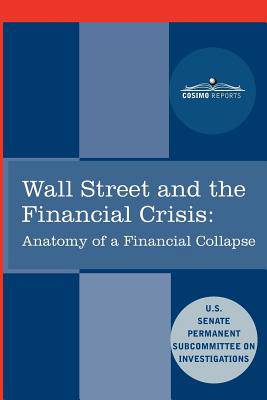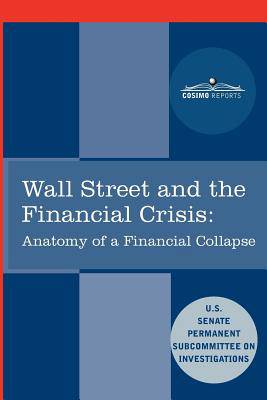
- Afhalen na 1 uur in een winkel met voorraad
- Gratis thuislevering in België vanaf € 30
- Ruim aanbod met 7 miljoen producten
- Afhalen na 1 uur in een winkel met voorraad
- Gratis thuislevering in België vanaf € 30
- Ruim aanbod met 7 miljoen producten
Zoeken
Wall Street and the Financial Crisis
Anatomy of a Financial Collapse
Senate Subcommittee on Investigations, United States
€ 39,45
+ 78 punten
Uitvoering
Omschrijving
After a two-year investigation by the Senate Permanent Subcommittee on Investigation, their report, Wall Street and the Financial Crisis: Anatomy of a Financial Collapse was released in April 2011. This is the most damning official report to date on Wall Street's role in the financial crisis. It describes the wheeling and dealing of bankers and others who benefited from the housing bubble while impoverishing the rest of America. It also offers four very clear causes of the financial crisis and, last but not least, it names culprits: - High risk mortgage loans by commercial banks were "the fuel that ignited the financial crisis" (describing the case study of Washington Mutual Bank, the sixth largest commercial bank at the time of its failure in September, 2008 ) - Failures by regulators "set the stage for mortgage loan losses that were a proximate cause of the financial crisis" (describing the case study of the Office of the Thrift Supervision, which was closed in 2010 and whose operations folded into the Office of the Comptroller of the Currency); - Inaccurate AAA credit ratings by the two largest credit rating agencies "constituted a key cause of the financial crisis" (describing Moody's and Standard & Poor's conflicts of interest while both had a quasi-monopoly position in the market for credit ratings); - Investment bank abuses: "The Investment banks that engineered, sold, traded, and profited from mortgage-related structured finance products were a major cause of the financial crisis" (describing case studies of Goldman Sachs and Deutsche Bank). This report and its detailed case studies are a must-read for policymakers, politicians, justice officials, bankers, journalists, academics and concerned citizens in order to understand what brought the economy to the brink of destruction. The U.S. SENATE PERMANENT SUBCOMMITTEE ON INVESTIGATIONS (PSI) is a bi-partisan team of senators that deals with Homeland Security and Governmental Affairs, and is currently headed by Senator Carl Levin (D-MI) and Senator Tom Coburn (R-OK). Formerly known as the Committee on Government Operations, PSI is the oldest subcommittee of the Senate Homeland Security Committee.
Specificaties
Betrokkenen
- Auteur(s):
- Uitgeverij:
Inhoud
- Aantal bladzijden:
- 666
- Taal:
- Engels
- Reeks:
Eigenschappen
- Productcode (EAN):
- 9781616405465
- Verschijningsdatum:
- 1/07/2011
- Uitvoering:
- Paperback
- Formaat:
- Trade paperback (VS)
- Afmetingen:
- 152 mm x 229 mm
- Gewicht:
- 875 g

Alleen bij Standaard Boekhandel
+ 78 punten op je klantenkaart van Standaard Boekhandel
Beoordelingen
We publiceren alleen reviews die voldoen aan de voorwaarden voor reviews. Bekijk onze voorwaarden voor reviews.











